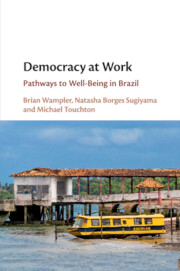Book contents
- Democracy at Work
- Democracy at Work
- Copyright page
- Contents
- Figures
- Tables
- Preface and Acknowledgments
- Interviews
- Abbreviations
- Introduction
- 1 Democracy at Work
- 2 Building Pathways for Change
- 3 Research Design, Methods, and Variables
- 4 Reducing Poverty: Broadening Access to Income
- 5 Improving Health: Saving Lives
- 6 Empowering Women: Saving Mothers and Enhancing Opportunities
- 7 Educating Society: Promoting Public Education and Learning
- 8 Pathways at Work: Lessons from Brazil’s Poor Northeast
- Conclusion
- Appendix Democracy at Work Pathways to Well-Being in Brazil
- References
- Index
Conclusion
How Democracy Improves Well-Being
Published online by Cambridge University Press: 28 September 2019
- Democracy at Work
- Democracy at Work
- Copyright page
- Contents
- Figures
- Tables
- Preface and Acknowledgments
- Interviews
- Abbreviations
- Introduction
- 1 Democracy at Work
- 2 Building Pathways for Change
- 3 Research Design, Methods, and Variables
- 4 Reducing Poverty: Broadening Access to Income
- 5 Improving Health: Saving Lives
- 6 Empowering Women: Saving Mothers and Enhancing Opportunities
- 7 Educating Society: Promoting Public Education and Learning
- 8 Pathways at Work: Lessons from Brazil’s Poor Northeast
- Conclusion
- Appendix Democracy at Work Pathways to Well-Being in Brazil
- References
- Index
Summary
The complexity, richness, and messiness of democratic politics generates opportunities for governments to expand citizens’ basic capabilities, agency, and rights. In turn, these advances contribute to individual and collective well-being This book demonstrates how multiple pathways within democratic regimes connect participatory institutions, rights-based social policies, and inclusive state capacity to human development. Of course there is no simple formula that permits citizens and governments to advance human development. We find that the slow, often cumbersome work of building democracy through participation, citizenship, and inclusive state capacity are crucial to initiate and sustain efforts to improve well-being. Each of these pathways can have a positive independent influence, but we find the strongest outcomes when two or all three pathways are activated simultaneously.
At the broadest level, our theoretical framework and mixed-methods approach demonstrate how a more comprehensive, fuller examination of democratic practice permits us to explain how governments, civil servants, and citizens work together to produce social and political change.
- Type
- Chapter
- Information
- Democracy at WorkPathways to Well-Being in Brazil, pp. 276 - 293Publisher: Cambridge University PressPrint publication year: 2019



